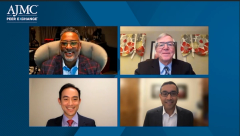
Trajectory of Treatment Landscape for Wet AMD and DME
In their closing thoughts, the expert panelists discuss the future of the disease state and treatment options, and how they expect provider, patient, and payer value perception to change in the future.
Jim Kenney, RPh, MBA: I want to thank you all for a rich and really informative discussion. I learned a lot, and I know the audience will as well. I want to give each of you a chance to share some final thoughts before we close the program today. I’ll start with you, Dr Sheth, if you’d like to share what is on your mind, whatever you want to share, and your closing comments. [It’s an] open forum here as we wrap up. Again, thank you all so much. This was fantastic, great commentary across the board, across all subjects.
Veeral Sheth, MD, MBA, FACS, FASRS: Thanks. In closing, I think for us, and I’m sure I speak for the other 2 members on the panel here, these are really exciting times. We’re seeing things moving forward for our patients in a way we haven’t in the last few years. That’s exciting for us. We want to carry that excitement forward. We want to be able to provide these treatments and therapeutics to our patients in a meaningful way and make an impact on their lives. I think this discussion, and if it leads to further discussions and one-on-ones and whatever it takes for us to continue that momentum, is really important. It’s been great being here today, and hopefully, this is just the first of many conversations in order to get us there.
Jim Kenney, RPh, MBA: Thank you. Dr Luo?
Caesar Luo, MD, FASRS, FACS: Thank you again for having me on the panel. It’s been great. I haven’t seen Joe and Veeral in a while, so it’s great to hang out with you guys even virtually. I went into ophthalmology because I remember reading a survey when I was in medical school, and of all of the medical conditions that people could have, the second scariest after cancer was blindness. Starting in 2006, we were able to have a conversation with patients who would ultimately be blind, that we could save their vision. That is an incredibly powerful statement to have. We are about to have potentially a treatment or at least a way to slow something called geographic atrophy, which we spoke about earlier, which is another blinding disease. Diabetes was the same way. We had laser for these folks with diabetic macular edema, and we can now arrest their disease process. I can’t get over this, that we are able now, we have the treatments now and we are getting more, to be more effective with the way that we can save patients’ vision and prevent blindness. I think as Veeral said, it’s such an exciting time, and for us to be able to have the flexibility to tell our patients we can do something that hasn’t been able to be done before, it’s an incredibly powerful thing to be able to bring to our patients. Let’s continue the conversation, and we’re happy to work with you to get there. Thanks again.
Jim Kenney, RPh, MBA: Thank you. Dr Coney, the last word for you today.
Joseph Coney, MD, FASRS, FACS: Jim, thanks for having me here. I really enjoyed my time on the panel. For me, ophthalmology, I can’t find a better profession. I’m truly a servant to the people who come to see me every single day. To see how we transform lives from a visual aspect, to keep people driving, keep them functioning to spend time with their grandkids, it’s a story. Now that I’ve been practicing medicine for 16 years, I can go back in a chart and see where they started and where they are now. The treatment landscape we have has allowed them to still be functioning. I’ve seen these people so much. I understand their journey. I understand what it took to get there. Having longer biologics means getting to that place in your life you want to be faster. I think that’s critical. Understanding the patient’s journey, I think this is the point in our lives where we have a chance to be on the right side of history and understand that journey. Medicine has not always been there for every single patient or been their advocate. This is the time when we can be there and show them and help them to have the lives they want to see.
I think vision is one of the most important things you have because once you lose your vision, I tell you now, my patients tell me it’s just not worth living. I’m hoping that we can continue to move the needle forward, and continue to work on longer, durable drugs. I think ophthalmology is a very exciting space. Of all of medicine, in a very short time, we have shown great results, reproducible results that we don’t normally see in other fields of medicine. Increasing quality of life is something I want to be part of as long as I can and be able to help my patients do the things they enjoy.
Jim Kenney, RPh, MBA: Great closing comments. I want to thank you all again. I want to thank our viewing audience. We certainly hope you found this AJMC® Peer Exchange to be useful and informative, and we look forward to seeing you on a future exchange as well. Have a great day everyone.
Caesar Luo, MD, FASRS, FACS: Thanks, everyone.
Joseph Coney, MD, FASRS, FACS: Thanks, everyone.
Transcript edited for clarity.
Newsletter
Stay ahead of policy, cost, and value—subscribe to AJMC for expert insights at the intersection of clinical care and health economics.










